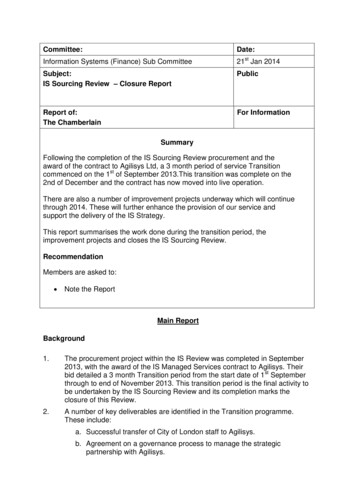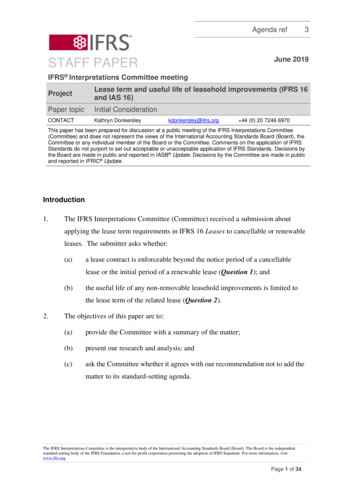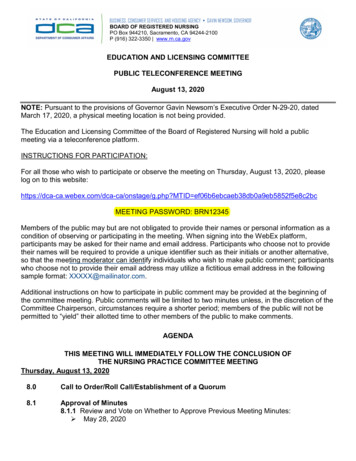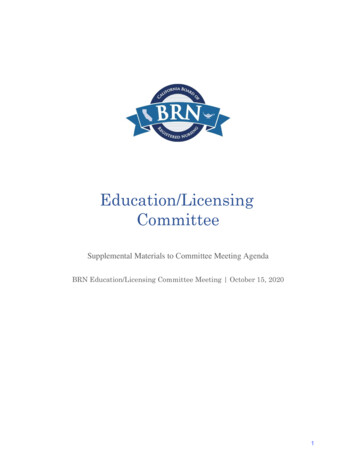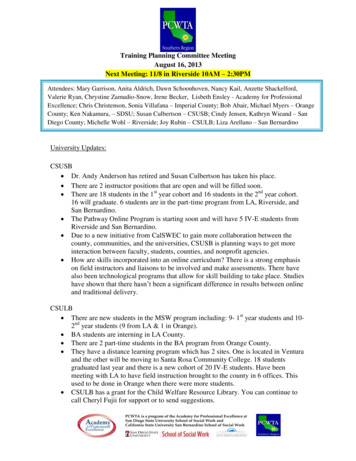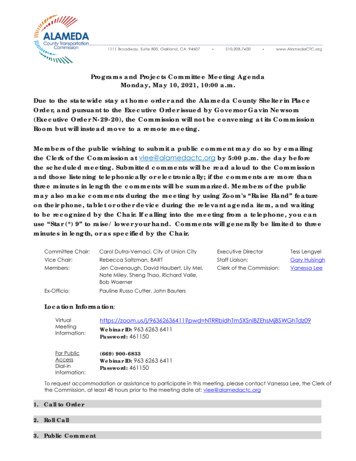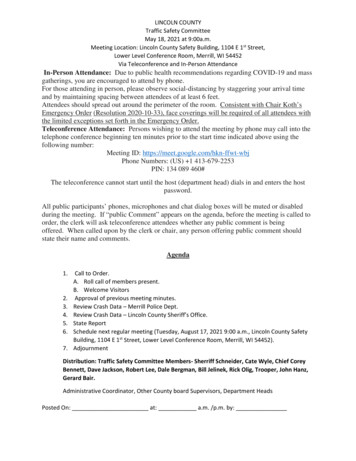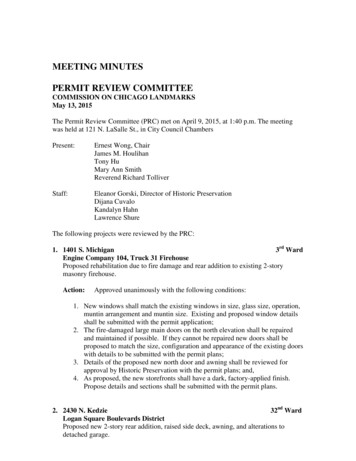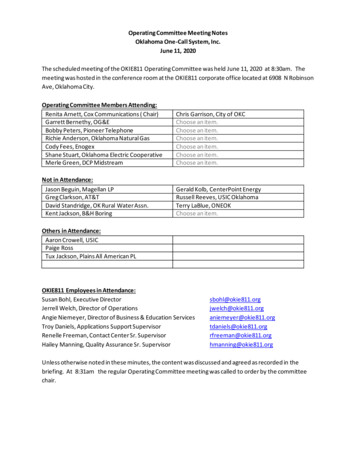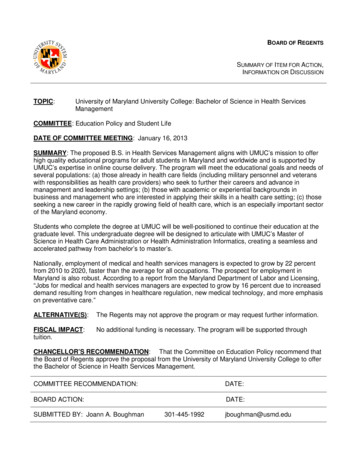
Transcription
BOARD OF REGENTSSUMMARY OF ITEM FOR ACTION,INFORMATION OR DISCUSSIONTOPIC:University of Maryland University College: Bachelor of Science in Health ServicesManagementCOMMITTEE: Education Policy and Student LifeDATE OF COMMITTEE MEETING: January 16, 2013SUMMARY: The proposed B.S. in Health Services Management aligns with UMUC’s mission to offerhigh quality educational programs for adult students in Maryland and worldwide and is supported byUMUC’s expertise in online course delivery. The program will meet the educational goals and needs ofseveral populations: (a) those already in health care fields (including military personnel and veteranswith responsibilities as health care providers) who seek to further their careers and advance inmanagement and leadership settings; (b) those with academic or experiential backgrounds inbusiness and management who are interested in applying their skills in a health care setting; (c) thoseseeking a new career in the rapidly growing field of health care, which is an especially important sectorof the Maryland economy.Students who complete the degree at UMUC will be well-positioned to continue their education at thegraduate level. This undergraduate degree will be designed to articulate with UMUC’s Master ofScience in Health Care Administration or Health Administration Informatics, creating a seamless andaccelerated pathway from bachelor’s to master’s.Nationally, employment of medical and health services managers is expected to grow by 22 percentfrom 2010 to 2020, faster than the average for all occupations. The prospect for employment inMaryland is also robust. According to a report from the Maryland Department of Labor and Licensing,“Jobs for medical and health services managers are expected to grow by 16 percent due to increaseddemand resulting from changes in healthcare regulation, new medical technology, and more emphasison preventative care.”ALTERNATIVE(S):The Regents may not approve the program or may request further information.FISCAL IMPACT:tuition.No additional funding is necessary. The program will be supported throughCHANCELLOR’S RECOMMENDATION: That the Committee on Education Policy recommend thatthe Board of Regents approve the proposal from the University of Maryland University College to offerthe Bachelor of Science in Health Services Management.COMMITTEE RECOMMENDATION:DATE:BOARD ACTION:DATE:SUBMITTED BY: Joann A. Boughman301-445-1992jboughman@usmd.edu
UNIVERSITY SYSTEM OF MARYLAND INSTITUTION PROPOSAL FORXNew Instructional ProgramSubstantial Expansion/Major ModificationCooperative Degree ProgramUniversity of Maryland University CollegeInstitution Submitting ProposalBachelor of Science in Health Services ManagementTitle of Proposed ProgramBachelor of ScienceDegree to be AwardedFall 2013Projected Implementation Date1202Proposed HEGIS Code51.0701Proposed CIP CodeThe Undergraduate SchoolDepartment in which program will be locatedCynthia DavisDepartment Contact240-684-2800Contact Phone NumberCynthia.Davis@umuc.eduContact E-Mail AddressSignature of President or Designee12/20/12Date
UMUCB.S. Health Services ManagementUniversity of Maryland University CollegeBachelor of Science in Health Services ManagementUniversity of Maryland University College (UMUC) proposes to offer a new degree program,the Bachelor of Science (B.S.) in Health Services Management. The degree will requiresuccessful completion of 120 semester hours of coursework including 36 semester hours in themajor.The B.S. in Health Services Management will provide students with a thorough grounding in thecore knowledge and skill competencies required for effective management and leadership in therapidly changing health care environment. The major will allow students to choose a focus onhealth services for the aging, technology and data analysis in the health care environment, ormanagement and leadership in specific types of health care organizations, through selection ofappropriate supplemental major courses.MissionThe mission of University of Maryland University College is to offer top-quality educationalopportunities to adult students in Maryland, the nation, and the world, setting the global standardof excellence in adult education. By offering academic programs that are respected, affordableand accessible technologically and through a variety of face-to-face formats, UMUC broadensthe range of career opportunities available to students, improves their lives, and maximizes theireconomic and intellectual contributions to Maryland, the nation, and the world.2This mission is rooted in UMUC’s institutional purpose as stipulated by State statute (Md.Education Code Ann. § 13-101(2012)); specifically that the university shall:(1) Operate as Maryland’s open university, serving nontraditional students who reside inMaryland, the United States and around the world;(2) Provide the citizens of Maryland with affordable, open access to higher education;(3) Continue as a leader in distributed education.As the public state and national leader in distance and distributed education, UMUC awardsassociates, bachelors, masters and doctoral degrees, as well as undergraduate and postbaccalaureate certificates. The university’s academic inventory offers programs that are core toany public university, but UMUC’s mission to the adult student results in an emphasis onworkforce relevant programs. Consequently, the university awards degrees and certificates in thearts and humanities, behavioral and social sciences, business and management, health-relatedfields, computing, education and technology, including degrees in fields facing critical shortages,such as cybersecurity, information assurance and graduate level teacher training in STEM areas.As part of its emphasis on workforce needs, UMUC offers non-credit professional developmentprograms such as those in executive leadership and, through its Inn and Conference Center andits Largo facility, hosts professional conferences and meetings that support the economic andsocietal needs of the State.1
UMUCB.S. Health Services ManagementThe B.S. in Health Services Management aligns with UMUC’s mission to offer high qualityeducational programs for adult students in Maryland and worldwide and is supported byUMUC’s expertise in online course delivery. The program will meet the educational goals andneeds of several populations: (a) those already in health care fields (including military personneland veterans with responsibilities as health care providers) who seek to further their careers andadvance in management and leadership settings; (b) those with academic or experientialbackgrounds in business and management who are interested in applying their skills in a healthcare setting; (c) those seeking a new career in the rapidly growing field of health care, which isan especially important sector of the Maryland economy. Meeting these goals and needs isconsistent with UMUC’s mission-based focus on career change and advancement for workingadults.This new major program will provide degree completion pathways for transfer and communitycollege students and will be articulated with associate degree programs such as healthinformation technology, health management, and health information management. Students whocomplete the degree at UMUC will be well-positioned to continue their education at the graduatelevel. This undergraduate degree will be designed to articulate with UMUC’s Master of Sciencein Health Care Administration or Health Administration Informatics, creating a seamless andaccelerated pathway from bachelor’s to master’s degree.Rationale and Need for the Proposed ProgramThe broad and multifaceted competencies needed for occupations in the changing health servicesfield are strongly aligned with UMUC’s own curricular strengths in management andtechnology. Health services management offers a complementary specialized area of offercareer pathways for students in this growing employment sector. UMUC already has strongonline degree programs in business and management, finance, information systems management,and gerontology, all of which draw upon the interdisciplinary competencies that also underpinthis new program and provide curricular support.UMUC is proposing this new degree program in response to national and state employment andcareer trends and potential student interests, and the needs of students currently employed inhealth and related fields, while taking advantage of regional expertise in the discipline. Thehealth care industry is a huge, complex system changing more rapidly than almost any otherfield. As the structure and financing of health care continue to change, the health care industrywill face challenges in technological innovations, an increasingly complex regulatoryenvironment, the integration of health care delivery systems, a heightened need for informationsecurity to maintain patient privacy, and an increased focus on improving quality care whilecontrolling costs.2
UMUCB.S. Health Services ManagementMarket DemandAccording to the Bureau of Labor Statistics of the U.S. Department of Labor, on the nationalfront 1:Employment of medical and health services managers is expected to grow by 22 percentfrom 2010 to 2020, faster than the average for all occupations. As the large baby-boompopulation ages and people remain active later in life, the healthcare industry as a wholewill see an increase in the demand for medical services. This increase will in turn resultin an increase in the number of physicians, patients, and procedures, as well as in thenumber of facilities. Managers will be needed to organize and manage medicalinformation and staffs in the healthcare industry. There will likely be increased demandfor nursing care facility administrators as well as baby boomers age.Employment is expected to grow in offices of health practitioners. Many servicespreviously provided in hospitals will shift to these settings, especially as medicaltechnologies improve. Demand in medical group practice management is expected togrow as medical group practices become larger and more complex.Medical and health services managers held about 303,000 jobs in 2010. Most medicaland health services managers work in offices in healthcare facilities, including hospitalsand nursing homes, and group medical practices.Prospective medical and health services managers have a bachelor’s in healthadministration. These programs prepare students for higher level management jobs thanprograms that graduate students with other degrees. Courses needed for a degree in healthadministration often include hospital organization and management, accounting andbudgeting, human resources administration, strategic planning, law and ethics, healtheconomics, and health information systems. Some programs allow students to specializein a particular type of facility, such as a hospital, a nursing care home, a mental healthfacility, or a group medical practice.The prospect for employment in Maryland is also robust. According to a report from theMaryland Department of Labor and Licensing 2, “Jobs for medical and health services managersare expected to grow by 16 percent due to increased demand resulting from changes in1Bureau of Labor Statistics, U.S. Department of Labor, Occupational Outlook Handbook, 2012-13Edition, Medical and Health Services -and-health-services-managers.htm (accessed November 27,2012).2“Career Clusters, Forecasting Demand for High School and College Jobs 2008 – 2018,” MarylandDepartment of Labor and Licensing, http://dllr.maryland.gov/employment/cpclusters.pdf (accessedNovember 27, 2012).3
UMUCB.S. Health Services Managementhealthcare regulation, new medical technology, and more emphasis on preventative care. Moremanagers will be needed to staff new clinics and other outpatient-care sites.”With the robust growth in positions in medical and health services management projected by theBureau of Labor Statistics, there will be substantial job opportunities, especially for individualswith experience in the health care field and/or strong business management skills. Managementskills and leadership competencies will be critical for employees working in hospitals, clinics,physician practices, health insurance organizations, nursing homes, mental health organizations,rehabilitation centers, health care associations, consulting firms, universities and researchinstitutions.Student Audience and Potential CareersThe proposed major is designed to attract several populations of students:1. Adults working in general medical and surgical hospitals, primary and ambulatory careentities, and managed care and long-term care facilities who wish to advance tomanagement positions;2. Adults working in non-profit or for-profit health care management companies thatprovide management services;3. Adults working in local, regional, state and federal government agencies with health caremanagement responsibilities;4. Transfer students with health care management or allied health care associate degreesfrom community college programs;5. Military personnel and veterans with responsibilities as health care providers;6. Adults working in business and management positions who are interested in applyingtheir skills in a health care setting;7. Adults seeking a new career in this rapidly growing segment of the economy.Students may choose to enhance this major with a complementary minor or with electives infinance, gerontology, biology, human resource management, management studies, computing,marketing, or economics, selecting from UMUC’s offerings to best suit their own interests andmeet the varying needs of their employers.Although the major will not require previous background in the field, students with transfercredit or experiential learning in health care or related areas will be able to use that credit, whichwill be evaluated for direct applicability or as supplementary credit and/or electives for thedegree. The degree will be articulated with associate degree programs existing at severalMaryland community colleges and at community colleges across the nation through UMUC’sextensive community college alliance network. Prospective articulation programs in Marylandinclude Health Information Management degrees offered by Montgomery College and PrinceGeorge’s Community College; the Health Care Management degree offered by HowardCommunity College; and the Health Information Technology degrees offered by Anne ArundelCommunity College, Baltimore City Community College, and Carroll Community College.4
UMUCB.S. Health Services ManagementProgram DuplicationThe MHEC inventory shows the following programs with similar titles: Coppin State University: Bachelor of Science in Health Information ManagementMorgan State University: Bachelor of Science Degree in Health with an optionalacademic track in Health AdministrationSojourner-Douglas College: Bachelor of Arts in Health Care AdministrationTowson University: Bachelor in Health Care ManagementUniversity of Baltimore: Bachelor of Science in Health Services Management.University of Maryland Baltimore County: Bachelor of Arts in Health Administrationand Policy with a concentration in health services administrationWashington Adventist University: Bachelor of Science in Health Care AdministrationAlthough these existing degree programs have titles similar to UMUC’s proposed program, closeanalysis reveals that UMUC’s proposed degree differs from these existing programs in intendedaudience, delivery mode, and academic content. The proposed program’s open access, fullyonline delivery, and management focus delivered through discipline-specific upper-level coursesdistinguish it from these other programs.UMUC is chartered by the state as Maryland’s open university, and its mission is to serveworking adult students who reside in Maryland, across United States and around the world. Theproposed degree will attract and serve that vast diversity of students. UMUC’s B.S. in HealthServices Management will be offered fully online to serve in-state and out-of-state students whoare adult part-time learners. Any onsite courses will be delivered in hybrid format that combinesonline and on-site instruction.In contrast, none of the existing programs in Maryland are offered fully online to serve adultpart-time learners, and none are available on an open admission basis. The UMUC program isalso designed to accommodate both transfer students and students just beginning their studies.Notably, UMUC’s proposed B.S. in Health Services Management differs from existing programsin terms of academic content. The proposed degree will require completion of 36 semester hoursof core and focus area courses for the major, all with a strong health care management focus anddelivered at the upper level. The degree will include a required course in Information Systems inHealth Care Organizations; students can take additional electives in Health Care InformationTechnology and Research and Data Analysis in Health Care.Coppin State University offers a Bachelor of Science in Health Information Managementthrough its Department of Allied Health within the School of Nursing. The focus of the CoppinState degree is narrower than that of UMUC’s proposed program, focusing specifically on datasystems and information technology used in the health care field. The recommended coursesequences are designed for students attending on a full-time basis taking face-to-face classes.http://www.coppin.edu/info/200131/academic programs/59/all academic programs/745
UMUCB.S. Health Services ManagementMorgan State University’s Bachelor of Science in Health is administered by its Department ofHealth, Physical Education, Recreation and Dance within the School of Education and UrbanStudies. Within this major, students may select a concentration in Health Administration (abusiness approach to health), Health Promotion and Education (a community approach tohealth), or Environmental Health (a scientific orientation to the field of health). The programwith a concentration in Health Administration requires 36 credits in the discipline and includesintroductory courses in accounting and economics plus upper-level courses in organizationalbehavior, human resource management, management information systems, and marketing.These courses are general in nature, not specific to the health care field. There are only twothree-credit upper-level courses that are specific to health care management (Health CareFinance and Health Service Management), but only the Finance course is required while theHealth Service Management course is available as a major elective. In addition, students maychoose major electives from health-related courses across a spectrum of areas includingsociology, psychology, epidemiology, and so on. The Morgan State program combines a broadbackground in health issues with general, basic skills in business, in contrast to UMUC’sprogram which is built on a core of upper-level, discipline-specific courses. It does not appearthat the courses for the program at Morgan State are available online, and thus the programappears to be aimed at traditional students.http://www.morgan.edu/school of education and urban studies/departments/health physical education recreation and dance/degreesmajors.htmlSojourner-Douglass College offers a Bachelor’s degree in Health Care Administration. Thedegree provides a foundation in management and specific courses in the administration of allaspects of health care. The courses cover a broad span including introduction to health careadministration, health economics, health maintenance organizations, health care informationsystems, health manpower, environmental health, health care policy and planning, women’shealth and health care in an urban setting. Embedded within the degree is a 12 credit internship,which would present a challenge to working adult students. The courses do not appear to
Jan 16, 2013 · BOARD OF REGENTS. SUMMARY OF ITEM FOR ACTION,. INFORMATION OR DISCUSSION. TOPIC: University of Maryland University College: Bachelor of Science in Health Services Management COMMITTEE: Education Policy and Student Life DATE OF COMMITTEE MEETING: January 16, 2013 SUMMARY: The proposed B.S. in Heal
